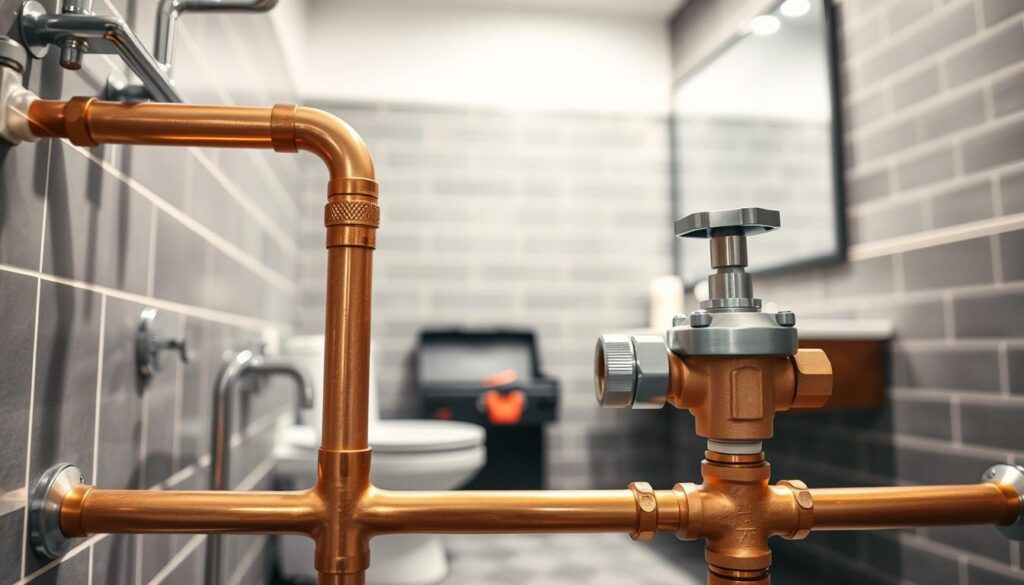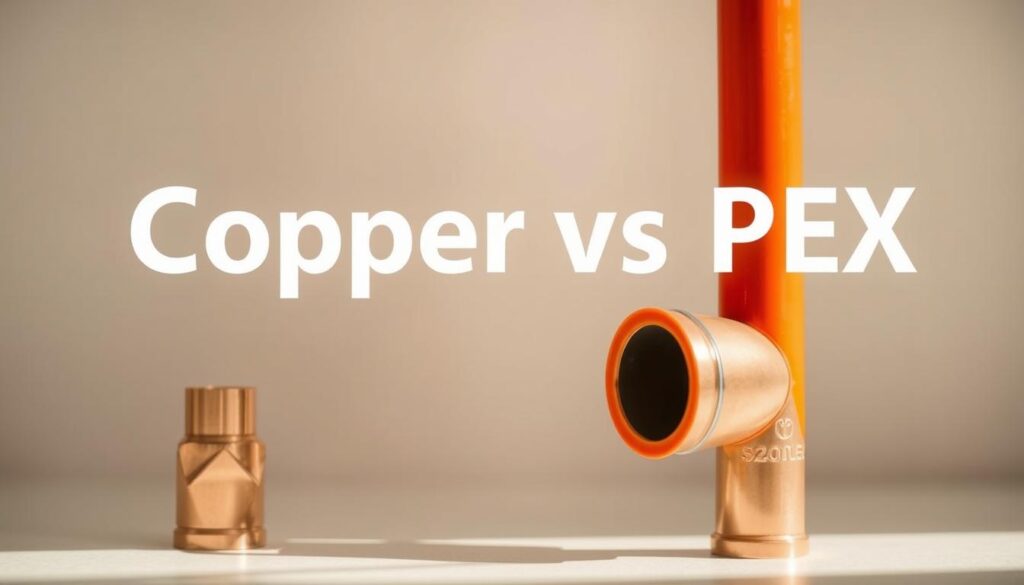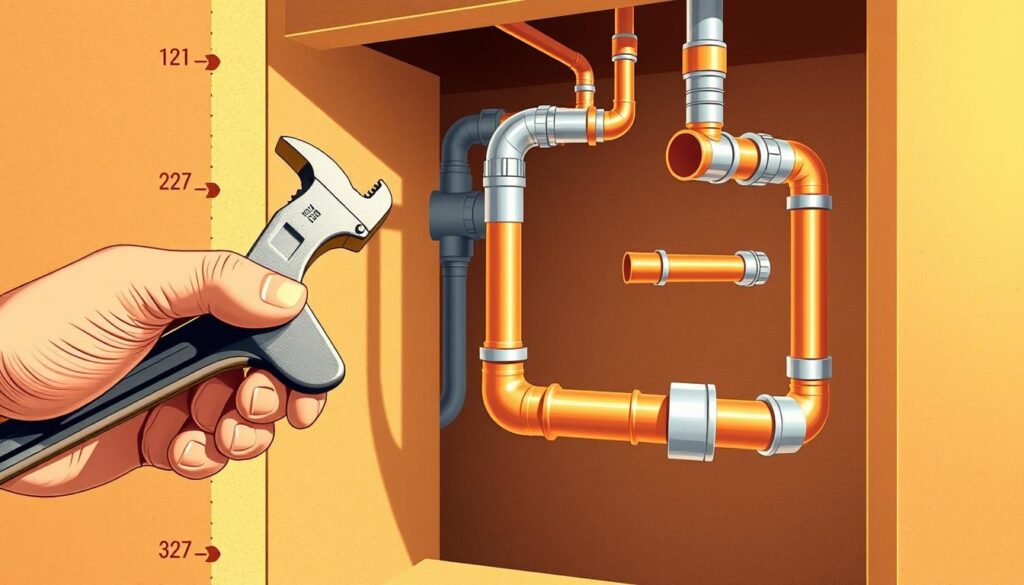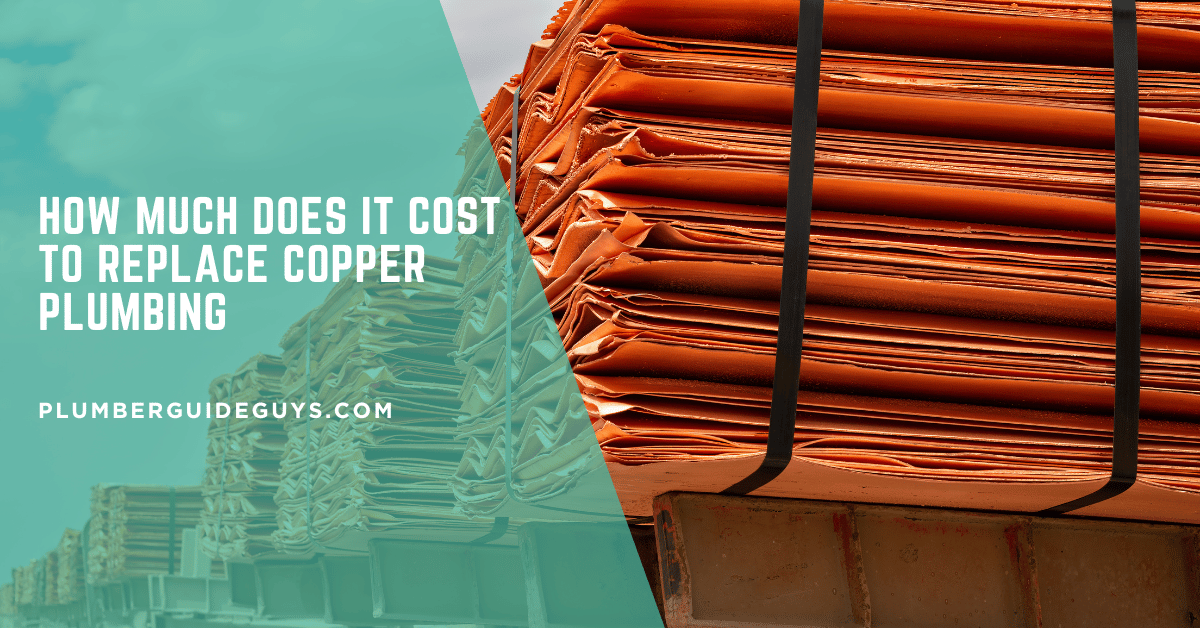Affiliate Disclosure
Plumber Guide Guys is a participant in the Amazon Services LLC Associates Program, an affiliate advertising program designed to provide a means for sites to earn advertising fees by advertising and linking to Amazon.
How Much Does It Cost to Replace Copper Plumbing? Did you know that replacing copper pipes in a home can cost between $8,000 and $15,000? It’s important to know the cost of replacing copper pipes to keep your home safe from water damage.

Several things affect the cost of replacing copper pipes. The size and age of your home, and the condition of your pipes, are key factors. Copper pipes have been used in homes for many years. But, they need to be replaced as they get old and corrode.
It’s wise to have a plumber check your pipes regularly. This can help you avoid expensive water damage and unexpected repairs.
Key Takeaways
- Copper pipe replacement costs range from $8,000 to $15,000
- Home size and pipe condition impact replacement expenses
- Regular plumbing assessments can prevent unexpected damage
- Professional evaluation is critical for accurate cost estimation
- Proactive maintenance can help manage replacement expenses
Table of Contents
Understanding Copper Plumbing Replacement Basics
Copper plumbing is common in homes, but knowing when to replace it is key. Homeowners often struggle to find the best time to replace their plumbing without breaking the bank.
Getting a professional to check your plumbing is important. They can spot problems early, saving you money and avoiding water damage.
Key Signs Your Copper Pipes Need Replacement
- Persistent water discoloration
- Frequent pipe leaks
- Reduced water pressure
- Unusual metallic taste in water
- Visible corrosion or pinhole leaks
Common Causes of Copper Pipe Deterioration
| Deterioration Factor | Impact on Pipes |
|---|---|
| Water Chemistry | Accelerates corrosion and pipe degradation |
| Age | Pipes become more brittle after 50 years |
| Installation Quality | Poor initial setup increases failure risks |
| Environmental Factors | Soil composition and water pressure affect longevity |
Knowing about these factors helps you decide when to replace your plumbing. Regular checks can stop costly repairs and keep your water system working well.
Average Copper Plumbing Replacement Costs by Home Size
Knowing the cost of copper plumbing can help you plan your home renovation budget. The price to repipe a home changes a lot based on its size. Smaller homes need less material and work, while bigger homes require more.
Homeowners will find different price ranges based on their home’s size. Copper plumbing replacement costs depend on your home’s area and layout complexity.
| Home Size (sq. ft.) | Average Replacement Cost | Estimated Labor Hours |
|---|---|---|
| 1,200 – 1,500 | $8,000 – $10,000 | 2-3 days |
| 1,500 – 2,000 | $10,000 – $12,500 | 3-4 days |
| 2,000 – 2,500 | $12,500 – $15,000 | 4-5 days |
Several factors affect the cost to repipe a home:
- Number of bathrooms and fixtures
- Accessibility of existing pipes
- Home’s architectural design
- Local labor rates
Pro tip: Always get quotes from licensed plumbers to get the right price for your home.
How Much Does It Cost to Replace Copper Plumbing: Complete Price Breakdown
Knowing the cost to replace copper plumbing helps homeowners plan better. A detailed estimate includes many factors that affect the total cost. This is important for your home’s plumbing system.
Replacing copper plumbing is a big project with many costs. Your final bill will depend on several key factors.
Labor Costs and Time Estimates
Plumbers charge between $45 and $200 an hour for copper work. The cost of labor depends on:
- How complex the pipes are
- The size and layout of your home
- How easy it is to get to the pipes
- The cost of labor in your area
Material Expenses and Options
The cost of copper materials can vary a lot. Here’s what you might pay:
| Material Type | Cost per Linear Foot | Recommended Use |
|---|---|---|
| Type L Copper Pipe | $2.50 – $4.50 | Interior residential plumbing |
| Type K Copper Pipe | $3.50 – $5.50 | Underground and high-pressure applications |
| Copper Fittings | $5 – $15 each | Connections and joints |
Additional Installation Expenses
There are extra costs to consider beyond materials and labor:
- Permit fees ($50 – $500)
- Wall or ceiling repairs
- Fixing water damage
- Inspection fees
Pro tip: Always get multiple quotes and make sure contractors give detailed price breakdowns. This helps avoid surprise costs.
Comparing Copper vs Alternative Plumbing Materials
Homeowners often face big decisions when it comes to plumbing upgrades. Copper has been a top choice for years. But, materials like PEX are becoming more popular because they offer cost savings and unique benefits.

Let’s look at the main differences between copper and other plumbing materials:
- PEX Piping
- Usually cheaper to install
- Flexible and easy to put in
- Resists freezing and corrosion well
- Costs less to replace than copper
- Copper Piping
- Has a long history
- Requires more rigid installation
- Can be pricier for materials
- Very durable in some environments
Your choice depends on several things. PEX costs between $2,000 and $4,000 for a 2,000-square-foot home. Copper can be $8,000 to $16,000. This big price gap makes PEX a good choice for those watching their budget.
Professional plumbers suggest thinking about your home’s needs before deciding.
Think about local building codes, water quality, and how long the material will last. Each option has its own benefits. These might fit better with your home’s specific needs.
Factors That Influence Replacement Costs
Knowing what affects your plumbing replacement estimate is key. Each home has its own challenges that change the cost of replacing old pipes. It’s important to think about these factors before starting your project.
When planning to replace copper pipes, several things affect the cost:
- Home structural complexity
- Existing pipe condition
- Local labor rates
- Material accessibility
Home Age and Configuration Impact
Older homes usually need more plumbing work. They might have special layouts that make installing pipes harder, raising the cost. Homes built before 1970 often need a full pipe replacement because of their old infrastructure.
Installation Accessibility Challenges
How easy it is to get to your pipes affects the cost. Homes with crawl spaces, complex walls, or many floors can increase labor costs. Areas that are hard to reach need special tools and more time, which raises the cost of replacing old pipes.
Regional Price Variations
Your location also matters when it comes to plumbing costs. Cities with higher costs of living have pricier labor than rural areas. Local building codes and permits can also change the price of your project.
Pro tip: Always get multiple quotes from licensed professionals to understand the full scope of your specific plumbing replacement needs.
Understanding the Replacement Process and Timeline

When you’re planning to replace your whole house plumbing, knowing the process is key. The cost to replace copper pipes can change a lot. This depends on your home’s layout and plumbing system.
A full plumbing replacement goes through several important steps:
- Initial home inspection and assessment
- Mapping existing plumbing infrastructure
- Developing a detailed replacement strategy
- Obtaining necessary permits
- Preparing the work area
Your plumbing team will work in a structured way to cause less trouble. The time it takes to replace your plumbing can be 2 to 5 days. This depends on your home’s size and how complex it is.
“Proper planning prevents poor performance in plumbing replacement projects.” – Professional Plumbing Experts
Important steps in the replacement include:
- Shutting off main water supply
- Removing existing copper pipes
- Installing new piping systems
- Pressure testing new connections
- Final inspection and cleanup
Pro tip: Schedule your copper pipe replacement during mild weather. This helps reduce inconvenience and water problems.
Replacing your plumbing will mean some water service disruption. But, professional teams work fast. They aim to disturb your daily life as little as possible.
Cost-Saving Strategies for Pipe Replacement
Managing plumbing upgrade expenses can be tough for homeowners. Smart planning and strategic decisions can lower the cost of repiping a house. By knowing key cost-saving methods, you can protect your home’s plumbing while keeping your budget in check.
Effective strategies can help cut costs without sacrificing plumbing quality. Strategic planning involves many factors that affect your total cost.
Strategic Project Timing
Timing is key in managing plumbing upgrade expenses. Here are some smart timing strategies:
- Schedule replacements during off-peak seasons when plumbers have less demand
- Plan projects during contractors’ slow periods for possible discounts
- Avoid emergency repairs by tackling pipe issues early
Material Selection Recommendations
Choosing the right materials is vital for repiping a house cost. Your choice should balance quality, durability, and affordability.
- Research different material options
- Compare long-term performance with initial cost
- Get advice from professional plumbers
- Look for pipes with extended warranties
Focus on materials that offer optimal performance and cost-effectiveness. Even if they cost more upfront, quality materials can save on future maintenance and replacements.
Required Permits and Building Code Considerations
When you’re looking at plumbing replacement estimates, you need to know about local permits. You’ll have to get the right legal papers for your copper plumbing project.
Most places need special permits for plumbing work. This is to keep everyone safe and follow the rules. Your estimate should include the cost of these permits. This can be anywhere from $200 to $1,000, depending on where you live.
- Check with local building departments for specific requirements
- Obtain necessary permits before starting copper plumbing installation
- Inspect permit fees in your specific municipal area
Building codes change by area but usually cover important plumbing parts. They make sure homes are safe by setting:
- Minimum material quality standards
- Proper installation techniques
- Safety requirements for water and drainage systems
Pro tip: Professional plumbers know the local building codes well. They can help you get the right permits quickly. Their knowledge ensures your copper plumbing is done right and can save you money and time.
Not getting the right permits can lead to big fines and delays. Always include these costs in your plumbing replacement estimate.
Conclusion
Replacing copper plumbing is a big home improvement project. The cost to repipe a home can be between $2,000 and $15,000. This depends on your home’s size, layout, and where you live.
Getting a professional to check your plumbing is key. They can tell you about your pipes’ condition and the best ways to fix them. It’s also smart to get quotes from different licensed plumbers to find the best deal.
Thinking about your home’s value and safety is important when deciding to replace copper pipes. Even though it costs a lot upfront, good plumbing can save you money in the long run. It makes your home work better and gives you peace of mind.
Every home is different, so your plumbing plan should fit your needs. Take your time to think about it. Consider the future and choose quality materials and work to protect your home.

